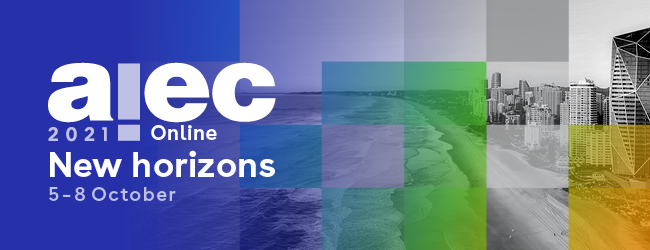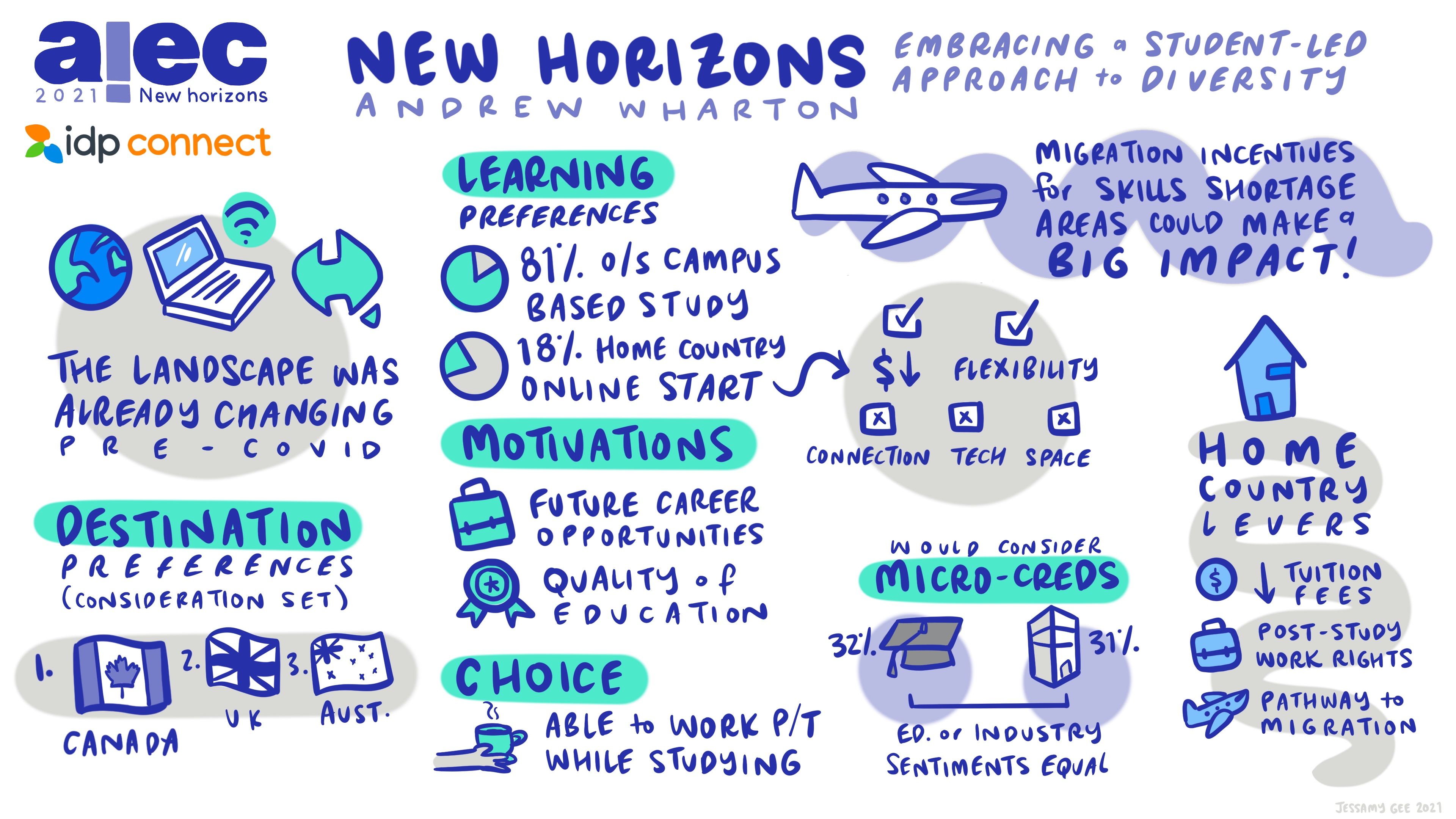AIEC 2021 – online

Dates: 5-8 October 2021
Location: Online
Theme: New horizons
Online program Program at a glance Photos Videos Virtual attendee hub
Exploring new horizons
The very first virtual AIEC was a runaway success, with more than 1200 attendees connecting through screens all over the world to learn, share, network and make meaningful connections. Together we explored new horizons for international education.
A new era is dawning for our sector and, despite much uncertainty, we enter it with innovative ideas, valuable experiences and a renewed passion to help international students and globally minded people achieve their goals.
This was perhaps the most important AIEC of our time. In 2020, our sector came face to face with a truly global crisis and as an industry we have been tireless in our collective effort to respond with innovation, agility and compassion.
AIEC was our opportunity to meet with industry leaders and our peers to share those special interactions that only come when we connect with one another. It was a chance to learn from our collective experiences and to strengthen our sector for the future.
The conference explored the theme ‘new horizons’ through five key subthemes: global challenges, digital innovation, life and learning, policy and politics and strategic insights.
Persistent themes discussed at this year’s conference:
- A global catalyst for change, post-pandemic
- Planning for tomorrow’s world
- Richer, holistic data driving decision-making
- Climate change
- Mental health
- Resilience, agility
- Digital innovation such as AR/VR, remote learning
- The need to change the narrative and develop a social licence for our sector
Key stats
| 1,225 delegates | 240 speakers | 7 keynotes |
| 78 livestreamed sessions | 43 Inspire presentations | 23 World in Focus presentations |
| 20+ Social Licence Ambassador sign ups | 60+ AIEC Activator participants | 50 hours of content |
| 175 Braindate topics created (130 group braindates and 45 1-on-1 braindates) | 440 Braindate participants | |
| 810 Braindate connections |
400 hours of learning through Braindate |
60 exhibitors |
| 25 magic tricks | 99 cocktail shakers | 90 rock stars |
Keynote speakers
Bernard Salt AMFuturist, trend-spotter, columnist, adviser and Australia’s best-known demographer
|
In this session, renowned demographer and columnist Bernard Salt outlined the case for training new workers, for upskilling and reskilling existing workers, and importing workers with the requisite skills to ensure our national prosperity. Bernard also addressed the topical question of how we balance a public rhetoric on job losses and economic growth with a much-needed skilled ecosystem created by international students. |
Website |
Ciara LancasterExpert in change fatigue and resilience and best-selling author of ‘Reimagine Change’
|
After a phenomenal year of challenges, Ciara explored the forces of fast-paced change, the factors contributing to change fatigue and fascinating human behaviour hacks designed to support you and your work through this time. “We need to start shifting our thinking to a more optimistic view. We need to focus on thinking about how we can lengthen our gaze and play the long game.” |
|
The Hon. Alan TudgeMinister for Education and Youth, Australian Government
|
The Minister outlined his optimism for the sector’s recovery and the numerous Federal Government efforts to support the sector. He thanked international students for the patience they had shown, particularly for those studying offshore, and reiterated the desire for their return to Australia for the full experience of studying and living in Australia. |
|
Danielle Di-MasiDigital expert in communications, engagement and behaviour, university lecturer and keynote speaker
|
Danielle Di-Masi’s keynote explored how our sector could foster genuine human experiences and build trusted relationships through our digital platforms. While the entire international education sector has accelerated its digital innovation, technology can be consuming and confronting and can lack a trusted human connection. How do we create a digital experience that not only stands out and is engaging and trustworthy, but that also meets the expectations of current and future students? This session provided ideas and tactics on how technology could empower your organisation to support stronger connections with students – now and into the future. |
|
Dr Greg BartonExpert in global Islamic politics, civil society, democratisation and countering violent extremism
|
The hope of post-COVID pandemic recovery is overshadowed by doubt and anxiety about the pace of recovery and the extent of lasting damage. Amid the uncertainty and confusion, some key underlying global trends and change-drivers stand out as presenting clear challenges, opportunities and responsibilities. These include: the increasingly damaging effects of climate change and associated paradigm-shift transformations; the rise of China and of Asia generally; the reconfiguration of geopolitics beyond Pax Americana; and the intractable problem of violent and hateful extremism. Dr Barton’s keynote stressed that effective responses to these required international partnership and cooperation and collaboration between researchers, educators, policymakers and practitioners. |
|
Dee MadiganExpert in advertising, politics, brands and social media
|
Never has it been so important to convince people of the value of the international education sector to Australia. But where do we start? Who are the people we need to convince? What do we say to them? How do we say it? Where do we say it? What influence strategies can we draw upon to ensure that government and the community understand the importance of international education? In this session, Dee Madigan examined these questions, highlighting the need to know your audience while understanding the competitive environment to hold the public’s attention. |
|
Fatima BhuttoPolitical writer, author and poet
|
In a time of unprecedented upheaval caused by the pandemic, the rise of right-wing governments and borders closing, Fatima Bhutto’s keynote asked: “Is it still possible to imagine a global future?” What does it mean to be a global citizen today? How can we overcome adversity in an era of collective pain? It is time to make space for new narratives to fully understand the new horizons ahead of us? “We must watch as sentinels over each other, watching to see who is in pain and work to assuage that pain. There is much to learn from others – we need new stories to understand our times. We must look out for each other.” |
|
Solli RaphaelAuthor, poet and Founder of Earth Enablers
|
Solli Raphael – Australia’s youngest ever Poetry Slam champion – shared his passion with us through poetry and the power of performance, encouraging us to look ahead, be inspired to work together and to seek new horizons for international education. “Stand for better It’s now or it’s never Because right now the Future ain’t forever. To reboot our future Our impacts must be lesser. To make it impact lesser We need to work together So stand for better.” |
Sessions highlights
If you’ve missed some sessions, or simply want to watch again, all sessions can be viewed by delegates on the Virtual Attendee Hub until Friday 10 January 2021.
International education climate change showcase
In a year where COP26 brought world leaders to Glasgow to discuss net zero carbon emissions, this showcase outlined how the international education sector could take ownership of the climate crisis to catalyse bold action to transform how we educate, collaborate and advocate for future generation of students.
Further information can be found at the CANIE website or by following @CANIEglobal
New perspectives: how market dynamics have shifted needs and expectations
Rob Lawrence outlined a series highly targeted microresearch projects, the comprehensive data intelligence gathered from these, and the rich insights driving roadmaps for the international education sector. Key themes covered included: new generation careers, employability assets, shifting course drivers, transitional considerations and impact, regional industry skill demands, case studies, VET skill needs, and what the new online learning and delivery landscape looks like.
Nobody told us there’d be days like this – IDP/Medibank
Throughout 2020-21 IDP conducted focus group sessions with onshore international students in Australia to better understand their concerns and the challenges they were facing, especially with respect to the pandemic. In addition to previously known needs for the highly emotional transition to studying overseas, which were heightened by the pandemic? Insights cover enhanced support for students on arrival in-country, health and wellbeing support, social engagement and career success.
Connected, creative, caring: Australia’s new 10-year strategy
Extensive stakeholder consultation has culminated in a new 10-year strategy for Australia’s dynamic international education sector. The three key words of connected, creative and caring have informed the content of this government-endorsed road map. As our industry embarks on its COVID recovery plan, our connectivity with partner institutions, agents, academics and other nations will be more important than ever. The key message and aspiration of the new strategy is that we must enhance Australia’s global reputation as a genuinely caring and welcoming study destination. Students need to be at the centre of all our endeavours.
The COVID-19 road to recovery for international education
Jonathan Chew, Navitas, delivered findings from an 18-month proprietary analysis assessing the impact of COVID-19 on international education. Drawing on surveys and research through the Navitas agent network and focused on the major destinations of Australia, the UK, Canada, New Zealand and US, this research was then compared with what has actually come to pass in 2020-21. Finally, the presentation outlined predictions for 2022 – largely dependent on government policies, vaccine efficacy and economic performance. Australia and NZ were predicted to lag behind their northern-hemisphere counterparts, effectively suffering from “long-COVID”.
New horizons – embracing a student-led approach to diversification
In this session Andrew Wharton shared unique data and insights from new future student research, which explored possible enabling factors for enhanced adoption of alternative online and offshore delivery models to support a student-first, market-led approach to diversification.
The research revealed that demand for on-campus study overseas had remained strong throughout the pandemic, with students considering migration incentives and employment opportunities when choosing where, what and how to study. This will be critical in combating Australia’s pandemic-driven skills shortage in a range of key sectors.
Social events
Welcome reception
AIEC 2022 kicked off in style! Our first ever virtual Welcome Reception, hosted by Kubarz, included music, jokes and laughs, as attendees all over the world sipped their cocktails and mocktails.
Magical Happy Hour – sponsored by IELTS
For Wednesday’s Happy Hour, AIEC delegates and their families were treated to an interactive magical experience presented by Adam Axford. From seemingly impossible cards tricks to spray-painting Banksy-style artwork on a wall, delegates were treated to a range of jaw-dropping illusions for the Magical Happy Hour.
Time to Rock ‘n’ Roll – presented by IDP Education
Who knew we had so many rock stars in international education? At our first ever virtual AIEC dance party, delegates were invited to bring instruments, voices and outfits to create their own rock ’n’ roll song – check out the video to see your colleagues in action!
Graphic Illustrations
Ever popular at AIEC, the graphic illustrations created by Think in Colour show cheerful, kinetic visualisations of key ideas from presentations. If you’ve not seen them all, they’re available at the Photo Gallery.
AIEC Activator
The key themes raised:
- ‘Humanise’ international education and move past the financial value of our students and our ‘industry’.
- Encompass both inbound international students and outbound learning abroad students, particularly when discussing ‘lost opportunities’ caused by COVID.
- ‘Talk local’ and connect at the people-to-people level by engaging in storytelling as a primary communication tool.
IEAA is working through the input from AIEC delegates and a range of recommendations will be presented to the IEAA Board for adoption at its November 2021 meeting.
Media coverage
- Campus Morning Mail Claire Field on new opportunities in international education
- The PIE AIEC 2021 wraps up with shared sense of optimism on horizon
- AFR (paywall) International education likely to suffer from long COVID
View content on demand
Accessing AIEC 2021 content after the conference is easy. If you registered and attended as a delegate, login to the Virtual Attendee Hub. The content is available on demand until Friday 10 January 2022.
9 February - Call for proposals opens
20 March - Call for proposals closes
April - Registration open
June - Program released
31 July - Super early bird registration closes
18 September - Early bird registration closes
27 - 30 October – AIEC 2026
{global_content name='counter'}{global_content name='key_dates'}{global_content name='subscribe'}{global_content name='slider_news'}

















